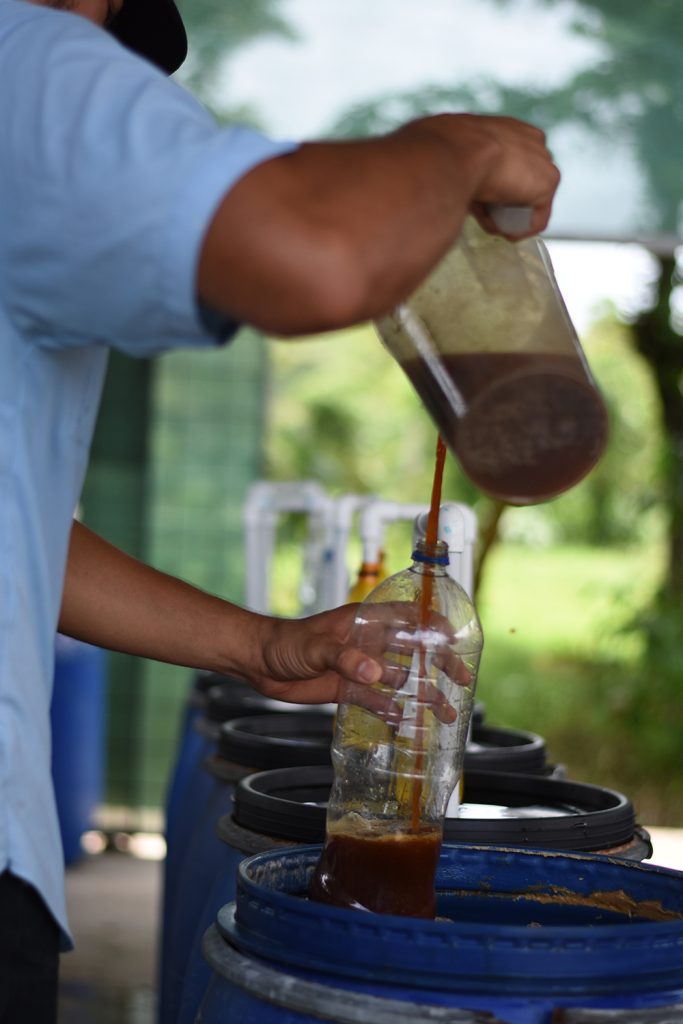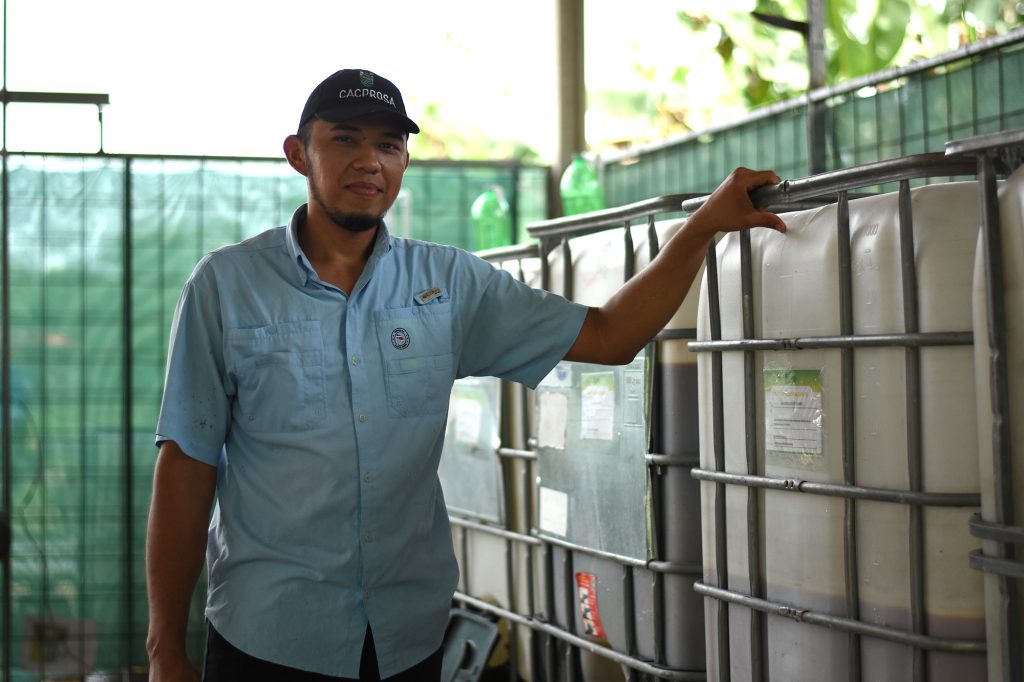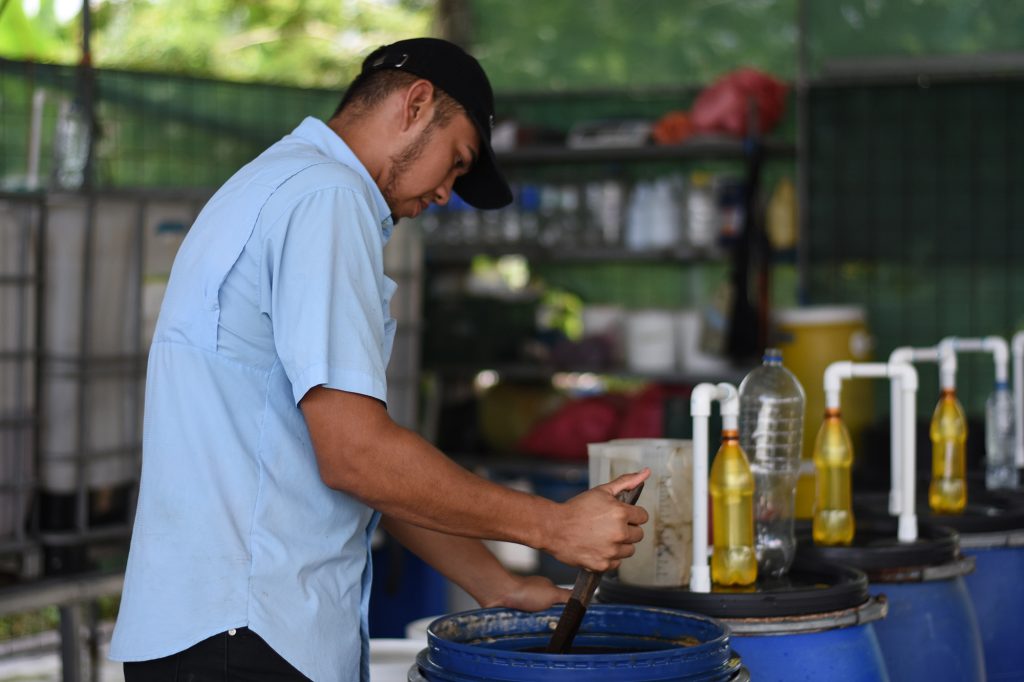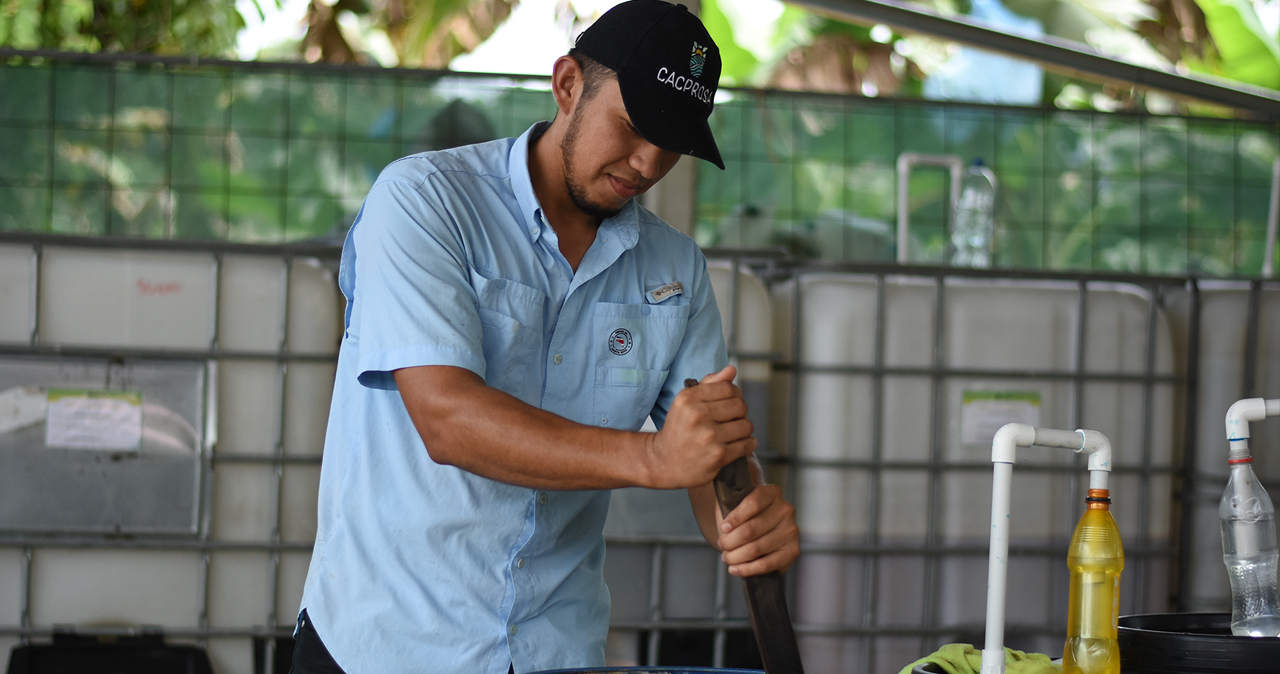It is said that working with microorganisms requires trust in the invisible. One must trust in processes that cannot be seen with the naked eye but are nevertheless crucial for life. This is what sparked a deep level of curiosity in José Aguilar, who for a year and a half has been in charge of the formulation of organic fertilizers at the biofactory of Cantonal Agricultural Center for the Progress of Sarapiquí (CACPROSA) in Costa Rica.
The existence of the biofactory is the result of CACPROSA’s partnership with the Resilient Agrifood Systems (RAS) Project led by EARTH Futures with funding made possible by a Walmart Foundation grant to EARTH University. This project seeks to strengthen producer organizations so that they become resilient and effective businesses with a positive impact on their communities.

After training more than 150 producers in organic production, the team was motivated to think further. “We realized that there was a need not only for our producers to know about bioinputs and how to apply them, but to produce them ourselves. So we shifted our focus, and together with EARTH we decided to build a biofactory,” says Luis Jiménez, Legal Representative of the Agricultural Center.
At that time, José was spending his holidays in Costa Rica, harvesting plantains. He had arrived to San Julián de Sarapiquí in 2021 from Nicaragua, where he was studying Civil Engineering. Shortly after, he left the civil engineering program, coming to accept that his professional path had little to do with building bridges and everything to do with the world of microorganisms he discovered through the opportunity offered by CACPROSA to lead the biofactory.
With the support of EARTH Futures, José trained in agricultural microbiology, soil nutrition, fermentation processes, and organic input management, all the elements essential to effectively formulate biofertilizers (organic foliar fertilizers). Additionally, he has learned to adjust formulations based on soil studies and to safely operate equipment, ensuring the production of effective and safe bioinputs that benefit rural communities.
Although his initial training was in the completely different field of civil engineering, José says that what began as a mere curiosity has transformed into a true passion for agronomy and the world of bioinputs. “For me, finishing a biofertilizer is a great satisfaction. When I finish fermenting it, I check its pH, its smell, its texture. Seeing the final product full of living microorganisms is a moment of immense gratification.”

Overcoming Challenges in the Era of Bioinputs
Bioinputs represent the intersection between modern science and ancestral wisdom. They result from observing and understanding how nature regulates and protects its own systems and, therefore, how it already has many of the answers to our current agricultural challenges.
This is why their adoption in agriculture has presented José Aguilar and the CACPROSA biofactory with an opportunity to lead significant and positive change in the region’s agricultural practices. Although producers were accustomed to the immediate results of conventional chemical fertilizers, José sees this situation as an opportunity to educate and demonstrate the true value of biofertilizers. “It’s been a whole learning cycle, because what we do with biofertilizers is feed the soil, and the soil itself is responsible for feeding the plant. It’s something different from the ideology the producer has,” he says, emphasizing the importance of introducing a new perspective in agriculture.
This challenge has made him more than just a biofertilizer formulator. José is now an advocate for sustainability. Initially, to gain the trust of producers, the biofactory offered free samples of biofertilizers, allowing farmers to see the benefits for themselves. Thanks to soil studies and field monitoring, José has demonstrated that while biofertilizers require a different approach, they offer significant and lasting benefits. “It’s a different process, but when producers see the results in the soil, they begin to understand that this is the path to better crops and sustainable production.”

José’s dedication has not gone unnoticed. For Luis Jiménez, thanks to the preparation and authority given to him, José has been able to make key decisions that have greatly benefited the producers. “He has shown impressive growth in his role. I hope that in the future we can formalize his knowledge by granting him the title of agronomist specialized in organic agriculture, as he has traveled a very important path in this field.”
Luis described how the current success of the biofactory is measured by the quality and volume of the products that producers deliver to the Agricultural Center’s collection center, such as plantains, yucca, and taro. “Although the increase in production is important, our priority is the soil. Our products are 100% focused on improving the resources we have in the soil and being able to maximize them so that the agriculture that is planted in the soil is better and better.”
As they continue to delve deeper into the art of working with microorganisms, both José and the CACPROSA biofactory continue to grow, reflecting the same cycle of life and regeneration that they promote in the soil. This continuous learning is making a direct impact on the community and the environment.
